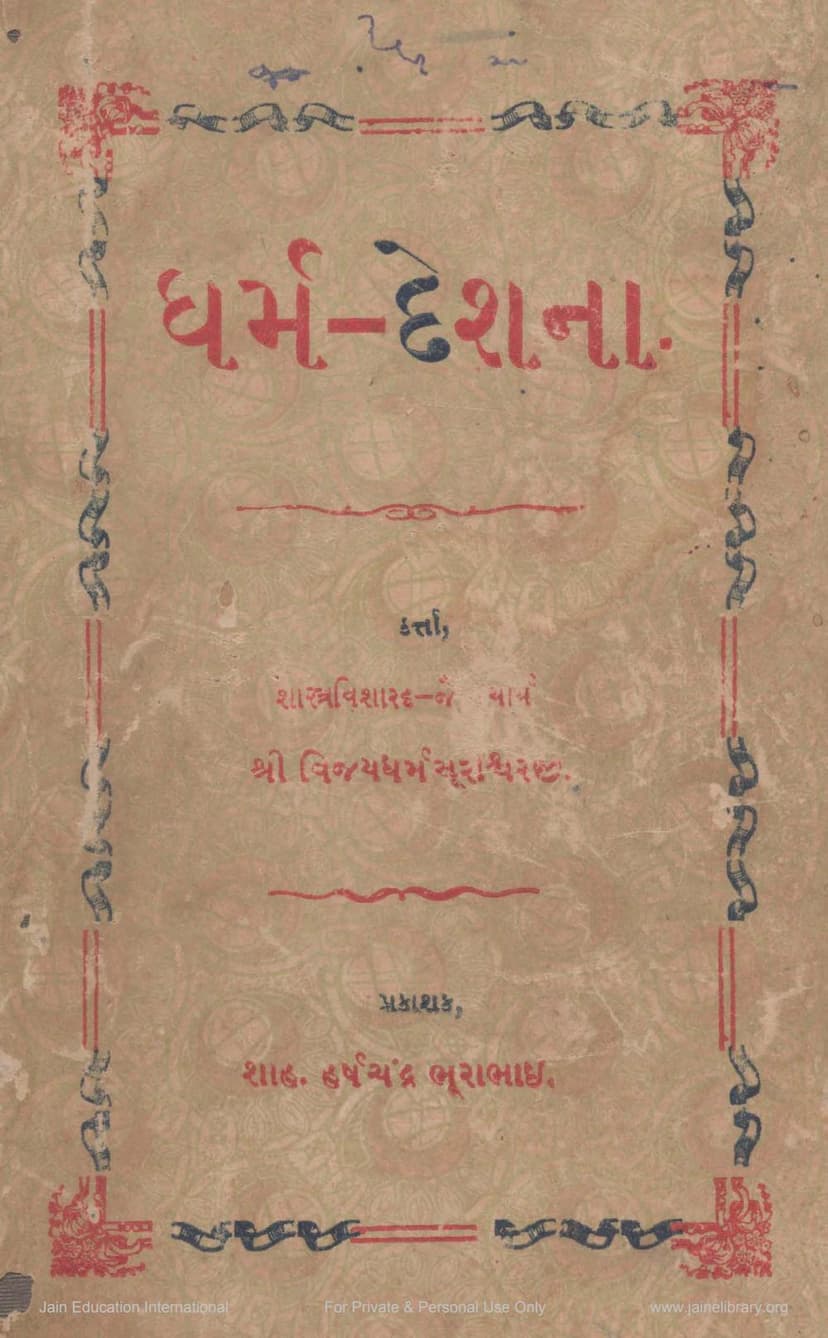Dharm Deshna
Added to library: September 1, 2025

Summary
Summary of "Dharm Deshna" by Vijaydharmasuri
This Jain text, "Dharm Deshna," authored by Vijaydharmasuri and published by Harshchandra Bhurabhai Shah, serves as a spiritual guide, detailing the life and teachings of Acharya Shri Vijadharmasuri. The book is structured to illuminate the path of righteousness and spiritual upliftment, focusing on principles central to Jainism.
Key Aspects and Themes:
- The Life of Acharya Shri Vijadharmasuri: The book chronicles the life journey of Acharya Shri Vijadharmasuri, initially known as Mulchandbhai. It describes his early life, his family background, his education, and his eventual renunciation of worldly life. The narrative highlights his transformation from a merchant's son to a revered spiritual leader.
- Vairagya (Detachment): A significant theme is the attainment of Vairagya, or detachment from worldly desires and possessions. The text emphasizes that true purity of life comes from shedding ego, conquering desires, and achieving self-control, leading to spiritual liberation.
- The Importance of a Virtuous Life: The book stresses that a virtuous life, exemplified by great souls, serves as a guiding light for ordinary individuals. It explains how even the Tirthankaras, like Lord Mahavir, were once ordinary beings who achieved spiritual heights through their selfless actions, pure thoughts, and unwavering adherence to righteous principles.
- Spiritual Discipline and Practice: The text details the rigorous spiritual discipline undertaken by the Acharya, including his dedication to study, guru-bhakti (devotion to the teacher), and the meticulous observance of vows and practices. His journey involves overcoming personal weaknesses and societal challenges to serve the Jain faith.
- Contribution to Jainism: "Dharm Deshna" showcases Acharya Shri Vijadharmasuri's extensive contributions to the Jain faith. This includes:
- Scholarship and Literature: His deep study of Jain scriptures, grammar, and philosophy, leading to the establishment of educational institutions like the Shri Yashovijay Jain Pathshala in Varanasi.
- Shasan Seva (Service to the Faith): His efforts in reviving and promoting Jain literature and philosophy, including the establishment of libraries and the publication of Jain texts.
- Social Reform and Compassion: His advocacy for Jiv Daya (compassion for all living beings), leading to the establishment of panjarapols (animal shelters) and his impactful sermons against violence and cruelty.
- Interfaith Dialogue: His ability to engage with and influence individuals from different religious backgrounds, promoting understanding and respect.
- Global Reach: The text notes his efforts to spread Jain teachings internationally, engaging in correspondence with scholars worldwide and gaining recognition for Jain philosophy.
- The Nature of Reality and the Soul: The text delves into philosophical discussions on the nature of the soul, karma, and the cycle of birth and death. It explains concepts like Naya (standpoints), Nikshetra (classification), and Pramana (means of knowledge), emphasizing the Jain understanding of the universe and the path to liberation.
- Overcoming Adversities: The narrative highlights the challenges faced by the Acharya, including societal opposition, personal hardships, and the rigorous nature of spiritual practice, yet emphasizes his unwavering determination and faith.
- The Ideal of the Ascetic Life: The book portrays the sadhu life as one of detachment, victory over attachment, and control over the mind. It celebrates the purity and effectiveness of such a life in elevating souls and guiding them towards liberation.
- Key Philosophical Concepts: The text introduces and explains core Jain principles such as Ahimsa (non-violence), Satya (truth), Asteya (non-stealing), Tyaga (renunciation), Brahmacharya (celibacy), Nirguna (without attributes), and the importance of the Panchmahavratas (five great vows).
- Call to Action: The book concludes with an inspiring call to the readers to embrace the teachings of Jainism, to cultivate virtues, to practice compassion, and to strive for spiritual liberation, thus contributing to the upliftment of both individual lives and society.
Overall Message:
"Dharm Deshna" is a comprehensive treatise that not only narrates the life of a great Jain Acharya but also expounds upon the profound spiritual and ethical principles of Jainism. It serves as a beacon, guiding individuals towards a life of righteousness, self-discipline, compassion, and ultimate spiritual realization. The text emphasizes that true happiness and liberation lie in understanding the transient nature of the world and the eternal nature of the soul, and in actively practicing the teachings of the Tirthankaras.